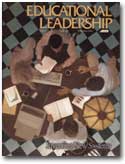The surge of interest worldwide in TQM and its potential for dramatically improving educational systems, processes, and outcomes is, predictably, beginning to spawn its share of detractors. One of the most confounding of these is Alfie Kohn, whose helpful ideas about the destructive nature of competition have given impetus to the Quality movement in education (as I have mentioned in Schools of Quality). So it comes as a surprise to me that Kohn is apparently so ill informed about TQM's benefits to education.
First, Kohn, citing my work, suggests that students should not be considered “workers” in the school. And yet, students are today—and always have been—workers in their schools. What's different in the Quality paradigm is the nature of the work. The antiquated Tayloresque mode of schooling, which was purposefully patterned after the culture of the industrial-age factory, forced students to conform to narrow institutional expectations of production prescribed by their teacher—the undisputed middle-management boss. The authoritarian climate of the school, like the environment of the factories into which most of the students were headed, was rooted in fear.
Today, the Quality movement provides a welcome point of departure from this outmoded, counterproductive model of education. In Schools of Quality, teachers and students, together, learn how to learn as they create collaborative, trusting environments in which failure is but a temporary step on the road to continuous improvement. They—along with policymakers, administrators, families, and others who support the work of the school—learn how to create true learning communities, where developing a “yearning for learning” is everyone's central focus.
These same ideas are also providing an essential focus for enlightened governments, businesses, and other organizations worldwide, as they struggle to break free from the legacy of Taylorism. The Quality movement can help us prepare young people to succeed as future leaders in developing a more democratic, humane way of thinking and acting in every aspect of their lives.
Second, Kohn suggests that students who focus on the quality of their work are less likely to succeed. Nothing could be further from the truth. In a Quality school environment of trust and mutual support, young people learn how to assess their own work and that of their peers. They learn how to use benchmarks to see how their own efforts can be continually improved. And they develop the skills of constructive metacognition—learning to identify and cultivate their innate abilities to build new meaning upon prior experience—thus continuously refining their personal learning capabilities. If we are to empower them to fulfill their potential, our students must focus more—not less—on the quality of their individual and collective efforts.
Third, citing my work and the work of others, Kohn states that “the rationale for adopting TQM in particular is often couched not in terms of how students can be helped to become self-directed, lifelong learners, but rather in terms of improving corporate competitiveness in global markets.” Nonsense! In my writings I've emphasized the primacy of developing in young people their own personal dedication to lifelong, life-wide, and life-deep kaizen (continuous improvement). Through their pursuit of this philosophy, we can guide students to explore the full range of their potential and encourage them to own their own learning processes. In this way, our young people can best lay the groundwork for success now in school and later in raising families, earning a living, and participating responsibly in our democratic experiment.
This Quality movement that's generating so much attention is ultimately all about people—about the joy of discovering how wonderful it can be to learn, to grow, and to be about the business of continuous improvement for themselves and all those whose lives they touch.
